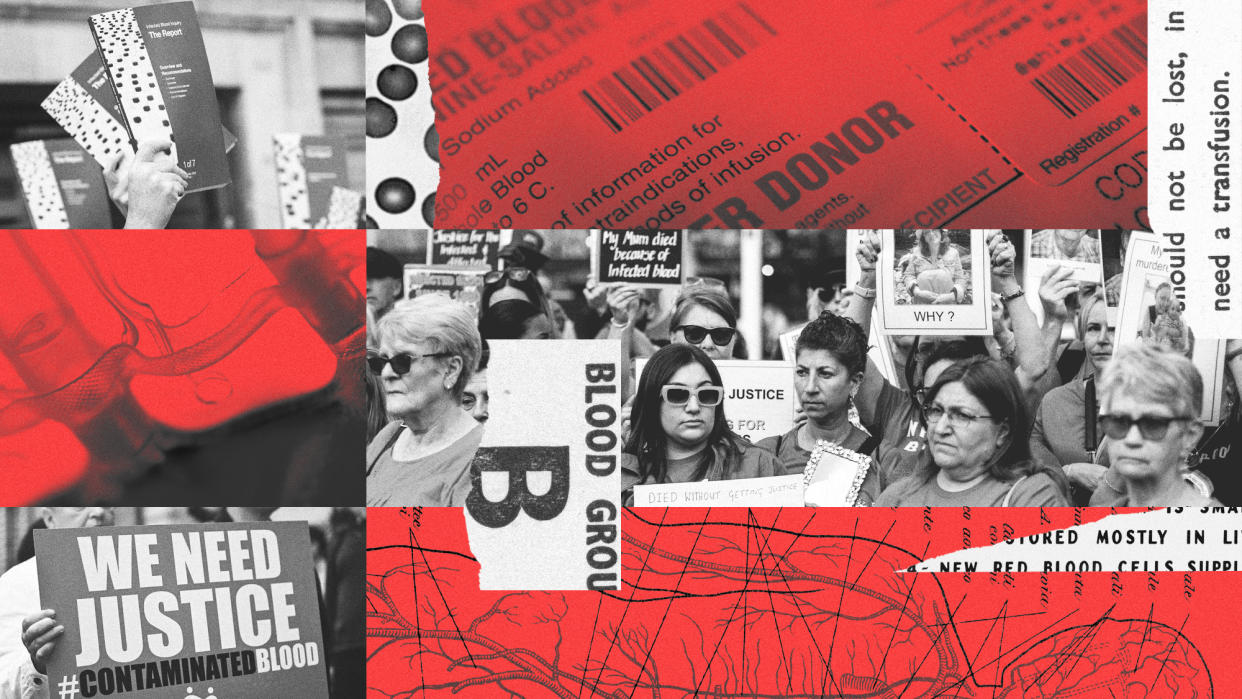Infected blood scandal: will justice be served?

- Oops!Something went wrong.Please try again later.
The British state "knowingly exposed" about 30,000 people to disease via contaminated blood in what is widely regarded as the worst treatment disaster in NHS history.
Yesterday the Infected Blood Inquiry (set up in 2018) published a 2,000-page report accusing the government of "hiding the truth" over the scandal for decades. The victims had been failed "not once but repeatedly" by doctors, the NHS, the civil service and the government, the report concluded. Sir Brian Langstaff, who chaired the inquiry, said the scale of the scandal was "horrifying".
Between 1970 and 1991, about 30,000 patients were given blood infected with diseases like hepatitis and HIV. About 3,000 people have died, and thousands more are living with potentially lethal diseases. Prime Minister Rishi Sunak told the House of Commons yesterday that he was "truly sorry" for the "decades-long moral failure at the heart of our national life". He called it "a day of shame for the British state", and promised to pay "whatever it costs" in compensation.
What did the commentators say?
"This is not some bland historical study," said Politico's "London Playbook" newsletter. "Those infected didn't just die. They endured years of stigma at a time when an Aids diagnosis inspired terror and smears. Their relatives fought for decades for justice."
The government has already made interim payouts of £100,000 each to about 4,000 survivors and bereaved partners. Today it has set out a £10 billion compensation package for victims and their families. Children were left without parents, while tens of thousands – perhaps hundreds of thousands – were infected with hepatitis (symptoms can take years to manifest). Money remains "the only currency in which recognition of fault can be paid", said The Independent, but ultimately any financial compensation will be "far too little, far too late".
The tragedy is also only one aspect of a wider scandal, said The Telegraph. The government's response to the "unfolding calamity" was not to halt the treatments, but to engage in a "large-scale cover-up". The inquiry found that there had been elements of "downright deception", including destroying documents.
Former health secretary Ken Clarke was also "heavily criticised" by the report, said Sky News. In 1983, he said there was "no conclusive proof" that Aids was being transmitted in blood products, although the report found that there was such evidence by 1982.
In 1985, Clarke described infections as "unavoidable adverse effects" from medical procedures. This was "indefensible", the report concluded. It gave "false reassurance" and, by "not telling the whole truth", it did not "spell out the real risk". Victims are calling for Clarke to be stripped of the peerage he was awarded in 2020 by Boris Johnson.
Overall, the report "highlights a culture of defensiveness" at the heart of the British state, said The Times, "a familiar theme" of scandals from the Hillsborough disaster to the two recent NHS maternity care catastrophes.
The former health secretary and now Greater Manchester mayor Andy Burnham is calling for a "Hillsborough law" to impose a legal "duty of candour on public servants" to avoid future cover-ups. He said such a law would break the cycle that has led to "Whitehall cover-ups" such as the Post Office scandal and the Grenfell tragedy.
John Glen, the Cabinet Office minister dealing with the scandal, has also refused to rule out criminal proceedings for those involved. It is "welcome" that prosecutions may follow, said The Telegraph's assistant editor Sherelle Jacobs. "But it is likely that too many will go unpunished."
Delayed justice has become "a grim ritual", while a succession of public inquiries has revealed that the state's secrecy is "so prolific, so compulsive, so endemic that it threatens to effectively render Britain a failed democratic state".
Taken in isolation, national outrages like the infected blood disaster and the Post Office scandal "elicit an impotent shiver of revulsion" from a disillusioned nation, said Jacobs. "Taken together, they are dynamite."
What next?
There will be "some satisfaction" for survivors that organisations and individuals were criticised, said Sky News's science and technology editor Tom Clarke.
But they must "wait for another day" for prosecutions because the Inquiries Act prohibits public inquiries from finding criminal or civil liability. If prosecutions are to come, it will be through the courts.
And the NHS's "institutional defensiveness", which the report criticised, is still "all too evident", said The Telegraph. The ongoing "persecution of NHS whistleblowers" shows how "institutional malpractice can be allowed to fester".
The years-long inquiry also shows that there is still "no quick mechanism" for addressing institutional failures. "The next such scandal may already be unfolding; will we once again be too slow to avoid it?"

